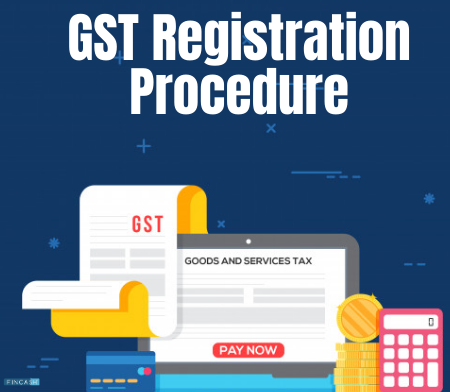Choosing CFO Account & Services for GST Registration in Singapore: What You Required to Know
Choosing CFO Account & Services for GST Registration in Singapore: What You Required to Know
Blog Article
From Beginning to Complete: A Comprehensive Review of GST Registration and How to Efficiently Register Your Service
Navigating via the intricate procedure of GST registration can be an essential action for any kind of service seeking to establish compliance and authenticity in the marketplace. Why choose CFO Account & Services for GST registration in Singapore. From recognizing the basic principles of GST to satisfying the qualification criteria and collecting the needed paperwork, the trip in the direction of successful enrollment can commonly appear like an overwhelming task. However, with the ideal advice and insights, companies can enhance this procedure and unlock the advantages that feature being a signed up entity.
Recognizing GST and Its Importance
Comprehending the Product and Services Tax (GST) and its importance is necessary for businesses running in economic situations where this tax system is applied. By enabling organizations to assert input tax credit histories on the tax paid on purchases, GST makes certain that tax obligations are determined just on the worth added at each phase of the supply chain.
Moreover, GST promotes compliance and openness in the tax regime, lowering tax evasion and increasing federal government revenue. It streamlines tax management and compliance for organizations by offering an usual platform for tax obligation filing and repayment. Overall, a thorough understanding of GST is critical for services to properly navigate the intricacies of the tax system and make sure compliance with the legislation.
Qualification Requirements for GST Enrollment
To register for GST, organizations need to satisfy specific qualification requirements laid out by the tax authorities. The key requirement for GST enrollment is that the company's aggregate turn over exceeds the limit established by the government, which differs by state. As of the current standards, services with an annual turn over of Rs. 40 lakhs or even more in many states should register for GST. Nonetheless, for organizations running in uneven areas and northeastern states, the threshold is Rs. 20 lakhs. Additionally, specific services, such as those involved in inter-state supply of products or services, informal taxed individuals, and non-resident taxed persons, are called for to register for GST despite their turnover.
Moreover, businesses entailed in providing products or services through e-commerce platforms are also mandated to sign up for GST, regardless of their turnover. Organizations that were signed up under the previous tax obligation routine, such as Barrel, import tax duty, or service tax obligation, must transition their registration to GST. Adhering to these eligibility criteria is crucial for organizations looking for to adhere to the GST regulations and avoid any penalties for non-compliance.
Records Required for GST Registration
When getting GST registration, organizations must guarantee they have all the needed records in order to finish the procedure efficiently and effectively. The essential papers required for GST enrollment include proof of organization registration or consolidation such as the Certification of Incorporation, partnership act, or registration certificate. Furthermore, businesses need to supply evidence of address for the principal business, which can be supported by papers like an energy bill or a rental contract.
Additionally, documents verifying the identity and address of the companions or marketers associated with business, such as frying pan card, Aadhaar card, or key, are vital for GST enrollment. Savings account declarations or terminated cheques displaying the name of the account, address, and service number are also compulsory to confirm the savings account information provided during registration.
Ensuring all the required papers are in order and easily offered will enhance see here the GST enrollment process and assistance organizations avoid difficulties or delays.
Online Registration Process for GST

After finishing the type, sustaining papers need to be submitted according to the guidelines supplied. These papers generally include proof of organization enrollment, address evidence, bank declarations, and identification proof of my company business owner. It is important to ensure that all papers are clear, valid, and posted in the specified layout to avoid hold-ups in the registration procedure.
When the application and documents are sent, companies can track the status of their GST enrollment online. If there are no problems or additional details needed, the GST registration certification will certainly be provided online, noting the successful conclusion of the online enrollment procedure.
Post-Registration Compliance and Tips

Services should remain updated on any kind of modifications in GST regulations, rates, or compliance treatments to make necessary changes immediately. Seeking professional aid from tax obligation consultants or accountants can additionally help organizations navigate complicated GST conformity requirements properly.
Conclusion
Finally, the process of GST registration is crucial for services to adhere to tax obligation laws and operate legitimately. By comprehending the qualification requirements, gathering the needed files, and finishing the on the internet enrollment process, services can successfully register for GST. It is necessary to stay certified with post-registration requirements and look for professional advice when needed to make certain smooth procedures.
Companies that were registered under the previous tax obligation regime, such as Barrel, excise task, or solution tax obligation, should transition their enrollment to GST. The essential papers needed for GST registration include proof of business enrollment or consolidation such as the Certificate of Incorporation, collaboration act, or registration certification.Upon effective completion of the GST enrollment process, businesses need to promptly stick to post-registration find here compliance requirements to preserve governing compliance and make certain smooth procedures.In final thought, the procedure of GST registration is crucial for businesses to abide with tax obligation guidelines and operate lawfully. By understanding the eligibility requirements, gathering the necessary documents, and finishing the on-line registration process, companies can successfully sign up for GST.
Report this page